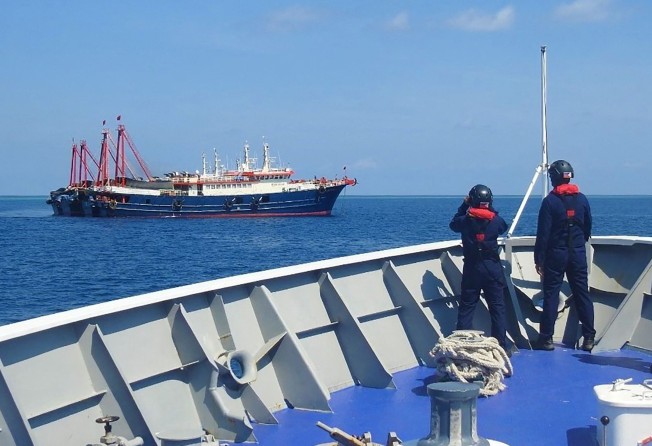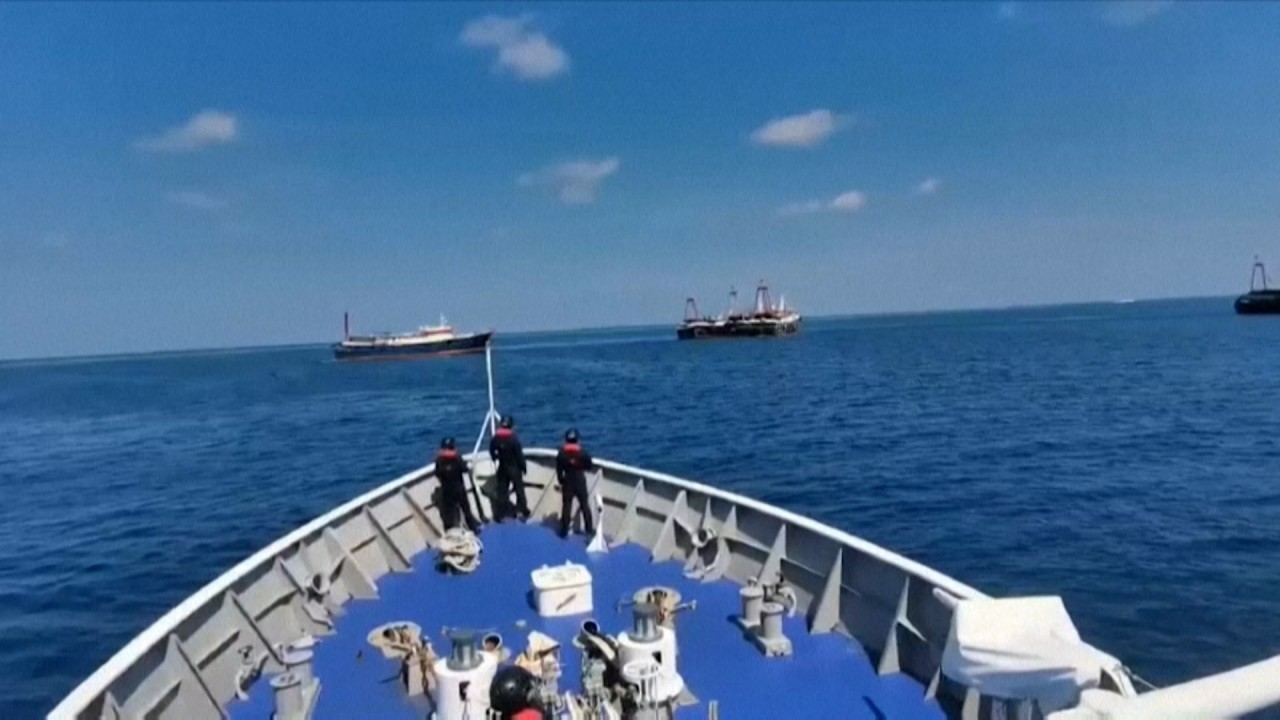
01:05
Philippine coast guard confronts Chinese maritime ‘militia’ vessels in South China Sea

To deter intruders in its maritime territory, the Philippines is pinning its hopes on a new secret weapon – a woman’s voice.
Coastguard officials are hoping that a new unit of 81 specially trained female radio operators – dubbed the “Angels of the Sea” – can deter wayward foreign vessels from entering its territory in the conflict-ridden waterway.
They are hoping the female operators will remind them of their wives and mothers.
The mastermind of the operation believes that not only will the women’s voices be more likely to ease tensions with foreign crews – who may resent a male operator barking commands at them – but they will also hold a psychological advantage over their opponents due to the matriarchal aspects of Asian societies.
The operation is understood to have been influenced by an incident in April in which the pre-recorded voice of a female coastguard operator appeared to drive off seven Chinese vessels caught loitering near a Philippine-claimed reef.

01:05
Philippine coast guard confronts Chinese maritime ‘militia’ vessels in South China Sea
Rear Admiral Ronnie Gil Gavan, who thought up the Angels of the Sea operation, said its appeal was “maternal”, as female voices evoked “the authority of wives or mothers that pervades the Asian culture”.
When the women finished their intensive two-week course last Friday, the coastguard’s deputy commandant for operations Leopoldo Laroya emphasised to the graduates the “unique importance” they had to play in “communicating with foreign ships, so as not to elevate tension”.
Speaking to This Week in Asia on Tuesday, the coastguard spokesman Commodore Armando Balilo said the women would soon be deployed to the West Philippine Sea – the term the Philippines uses for the portion of the South China Sea it claims, including its exclusive economic zone.
Balilo said that even before the newly graduated all-female class, the coastguard had several women radio operators working in some of the toughest areas, including the Sibutu Passage, a deep channel between the Sulu Archipelago in the southern Philippines and Borneo that is notorious for piracy and kidnappings.
Balilo said that in the Sibutu Passage, “female radio operators serve as the reassuring voice of a mother to a child, or a girlfriend or wife to a loved one facing a perceived danger … to temper seafarers’ anxieties at the height of piracy and kidnappings”.
One incident in particular that has inspired the Angels happened on April 27, when lawyer Gretch Mary Acuario, a female coastguard radio operator on board BRP Cabra, issued a challenge to one of seven Chinese vessels near Sabina Shoal, an atoll in the South China Sea claimed by both China and the Philippines.
“Unidentified foreign vessel at Sabina Shoal, this is the Philippine coastguard, you are within the Philippine exclusive economic zone … You are requested to provide the following: name of vessel, intention, last and next port of call,” Acuario said in her pre-recorded message.
Instead of replying, the seven Chinese vessels simply moved away.
The incident earned rare praise from the presidential palace and presidential spokesman Harry Roque used it as proof that “the President has vowed no territory will be lost during his administration and that’s being implemented now”.
Vice-Admiral Laroya said the Angels of the Sea would become “the voice of peaceful and rules-based order at sea, especially in the Philippines’ sensitive maritime frontiers”.
Meanwhile Commodore Balilo said the Angels would follow a protocol (Standard Radio Challenge and Responses) approved by the coastguard and the Department of Transportation and the Rules on the Use of Force as approved by the National Task Force on the West Philippine Sea under the Office of the President.
However, at least some women seem less than impressed with the operation.
“If the goal is to relieve stress and to reassure people in distress, perhaps there’s some data behind it and it might have a good effect,” said Dr Sylvia Estrada-Claudio, a former director of the University of the Philippines Centre for Women and Gender Studies.
“But other than that, I don’t see what goals the coastguard can achieve in the West Philippine Sea because there are far more important considerations when Chinese vessels decide to stay or leave.”

01:02
Philippine Coast Guard fends off Chinese boats in disputed South China Sea
“If it is to shoo away those who have definitely broken the rules of the law of the sea, I doubt whether the voice, male or female, of the radio operator makes any real difference,” said Estrada-Claudio, now dean of the university’s college of social work.
As a medical doctor and feminist who has worked to prevent violence against women for nearly 40 years, she took exception to the idea that Asians lived in matriarchal societies and said the reason given for deploying women radio operators was therefore based on a “myth”.
“The idea that Asian societies are matriarchal is actually a patriarchal lie to cover up the power realities in our societies. Our societies remain patriarchal.”
As proof, she pointed to how even women from rich backgrounds were rarely in control of their families’ wealth.
Meanwhile, she said, “most of the time in cash-strapped families, the man gives the women his pay cheque after he has taken out his drinking money, his gambling money and his money for other forms of vices.
“And it is the women’s burden, not her power, to make a very small amount of money fit the needs of the family. And being unable to stretch that purse to cover needs is one of the causes of domestic violence.”
Added Estrada-Claudio: “Perhaps a stronger diplomatic stance and clearer analysis of the geopolitics in the area and a better understanding of how we balance the power interests in the region would serve our interests better than quibbling about voices, whether male or female, will have any real effect on the equation.
“Otherwise I’d die of laughter.”